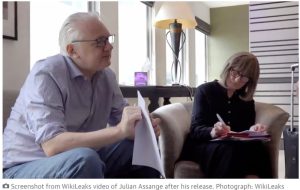‘Smart’ Sanctions – Still a Blunt Instrument of War?
By Lola Hynes – Irish Anti War Movement
The daily threat of war and the implementation of harsh economic sanctions have crippled the Iranian economy and are causing devastating effects on ordinary Iranian people. There has been some form of sanctions imposed on the Iranian people by the West since the 1979 revolution; however since 2010 they have been greatly intensified and are unprecedented in their severity. These sanctions violate international law and the UN charter for their damage to Iran’s civilian population. The sanctions regime constitutes an illegitimate form of collective punishment toward the weakest and poorest members of society; women, children, the poor, the chronically ill and refugees. The latest rounds of so called ‘smart’ sanctions imposed by the US and the EU are designed to target the state and not the people. However as they affect the banking, financial and oil sectors they are having a detrimental effect on the economy and therefore the Iranian people. As noted by the former UK representative Peter Jenkins to the UNSC the sanctions are unlawful under article 39 of the UN constitution as no evidence of diverting uranium into a nuclear weapons programme has been found.
‘Smart’ Sanctions – Still a Blunt Instrument of War?
By Lola Hynes – Irish Anti War Movement
The daily threat of war and the implementation of harsh economic sanctions have crippled the Iranian economy and are causing devastating effects on ordinary Iranian people. There has been some form of sanctions imposed on the Iranian people by the West since the 1979 revolution; however since 2010 they have been greatly intensified and are unprecedented in their severity. These sanctions violate international law and the UN charter for their damage to Iran’s civilian population. The sanctions regime constitutes an illegitimate form of collective punishment toward the weakest and poorest members of society; women, children, the poor, the chronically ill and refugees. The latest rounds of so called ‘smart’ sanctions imposed by the US and the EU are designed to target the state and not the people. However as they affect the banking, financial and oil sectors they are having a detrimental effect on the economy and therefore the Iranian people. As noted by the former UK representative Peter Jenkins to the UNSC the sanctions are unlawful under article 39 of the UN constitution as no evidence of diverting uranium into a nuclear weapons programme has been found.
The rationale behind the sanctions is that it will force the state to slow down its nuclear programme, however as Iran has not been able to prove to the UN Security Council that it is not diverting uranium to a nuclear weapons programme, this is a catch 22 situation. Iran’ s energy needs have increased dramatically in recent years and the ban on importation of crude oil, gasoline and refining products has made the need for domestic nuclear energy paramount in a country whose population has doubled to 70 million in the last 30 years.
During the 1980’s sanctions regime almost 50% of the population lived in rural areas, were largely self sufficient and as a consequence were not as badly affected. In recent years continued migration to urban areas has led to expansion of cities creating an urban poor, the latest sanctions effect this section of society the most and economic and class divisions are being exacerbated. The possibility of reform of the state has become diminished and the militarised environment is accelerating repressive state policies. Sanctions and the threat of war allow the state to invoke ‘a state of emergency’ which makes repression of critics of the regime and dissent all the easier.
The rationing of gasoline as a result of sanctions has caused the price of petrol to double since 2009. The increase in domestic refining of lesser quality gasoline has been shown to have serious detrimental effects on the air quality and consequently the health of Iranians. High levels of toxic aromatics are found in the air particularly in the cities and serious respiratory and cardiac complaints have been reported as a result of this. 310 deaths a day were reported in October and November of 2011 as a direct result of poor air quality.
The Rial has halved in value due to unprecedented sanctions on the central bank and all of its monetary and currency transactions. This inflation has widespread and endemic effects, prompting hoarding from merchants and shop keepers with an increase in the price of goods and foodstuffs of up to 100%. Bread, which is a staple of the Iranian diet has increased by 1500% in the last 2 years, this has been partly due to the removal of state subsidies. Rents have doubled in some areas. A reliance on a cash based economy is emerging allowing for the black market to flourish, reducing transparency in financial transactions.
It has become very difficult for Iranians to obtain medicines needed for the chronically ill; the imports of over 50 badly needed drugs for cancer, paediatric cancers, MS, and heart diseases etc. have declined drastically. This is due to the banking sanctions and restrictions on the companies that insure Iranian shipping making it impossible to import foreign made medicines. Domestically made medicines have gone up in price a result and many ordinary Iranians either cannot find or afford the medicines they so badly need. Some are opting for early death so as not to burden their families.
Perhaps the greatest effect of sanctions is on the women of Iran. With an already very conservative ideology toward women, the opportunity for further oppression and abuse is growing. Men are seen as the breadwinners and the education and employment of women are seen to undermine family values. Due to the shrinking of the economy women are being pushed out of the work place and are bearing the brunt of unemployment. Many of these unemployed women are heads of the household as a result of male casualties in the war with Iraq, the burden on these families is immense .Quotas have been introduced to limit women’s access to higher education; families are withdrawing girls from education to enter into the labour market or child marriages as they simply cannot afford to feed them. Similar socioeconomic pattern that were seen in Iraq during the 1980’s sanctions are emerging when a large increase in child marriage was seen.
Lower wages and fewer jobs are impacting on men’s ability to live up to social expectations; this can lead to depression and an increase in violence towards women. With a decrease in family income the coping strategies of women include cutting back on their own dietary and health needs in order to support their dependants. An increase in child labour and sex work has been seen in Iran in recent years.
The civil rights movement in Iran is being seriously undermined by sanctions. The Iranian regime has been widely criticized for its restriction on freedom of speech and its unequal treatment of its people according to gender and religion. Dissenters are treated harshly, as has been seen with the torture, murder and imprisonment of political opponents and protesters. The debilitating sanctions and daily rhetoric of war has elevated national security concerns and further diminished the states tolerance of activists. Human rights and civil activists in Iran are retreating from voluntary work with charities and civil society organisations due to economic concerns. Many are becoming dependent on the state and are fearful of engaging in civil activism. The inabilities to transfer funds from abroad affects charitable organisations, particularly of concern are those engaged in health and medical services and help for disadvantaged women and children. Many of these have ceased their activities.
Iranian activists are becoming more isolated internationally due to sanctions, with Visa restrictions and the inability to attend overseas conferences etc. Nobel Prize Laureate Shirin Ebadi, honored for her work on human rights and free speech in Iran, was prevented from publishing a book in the US due to publishing restrictions. This denial of the free speech so cherished by the US is a denial of basic human rights and just as Iranians so badly need solidarity they find themselves increasingly isolated from the world. This exposes the hypocrisy of the West in its criticism of the Iranian regime’s treatment of its people , while the US and EU imposed sanctions are facilitating the state to further repress women, human rights activists, and marginalized groups.
Many prominent figures have commented on the ineffectiveness of sanctions including Professor Adam Roberts, a research fellow at Oxford University who stated that there are very few examples in history where sanctions have worked. In the 1980’s sanctions were imposed in Iraq in order to force them to give up or suspend manufacture of weapons of mass destruction. These weapons were non – existent and the sanctions did not prevent the 2003 invasion of Iraq which killed hundreds of thousands of innocent people. According to Professor Joy Gordon of the Global Justice Programme at Yale University, there were between 670,000 and 880,000 excess child mortalities in Iraq due to these sanctions. (These figures vary according to the source as it is difficult to isolate the components involved). These brutal sanctions were described as genocide by Denis Halliday, former UN humanitarian coordinator and caused his resignation. It was after this devastation that so called ‘smart’ sanctions were born. Similarly the current sanctions regime on Iran is aimed at halting a nuclear weapons programme, of which no evidence or proof has been found. We do not want to see a repeat of the devastating effects of sanctions had on the children of Iraq.
I conclude that ‘smart’ sanctions are still a blunt and crude instrument of war, that serve to damage the lives of ordinary people and not the ruling class who will always find ways around economic restraints. Sanctions have a poor record of influencing the behavior of states, are a step closer to war and weaken society, not the state. The adverse effect of these sanctions on healthcare, women’s security and the freedom of Iranians needs to be addressed immediately. As this article is being written the situation is worsening as the Rial has depreciated further and Iranian protesters are facing a harsh reaction from the state. The Irish Anti War movement calls for an all out stop on sanctions and the language of war which are impinging on the human rights of the Iranian people. We call on the Irish government to condemn the sanctions and threat of military intervention in Iran which are unlawful and unjust. We need to question the reasons for this war mongering, is it regime change, hegemony in the region that the West is after?
ICAN Brief 3; July 2012, Killing them Softly; The Stark impact of Sanctions on the lives of Ordinary Iranians






